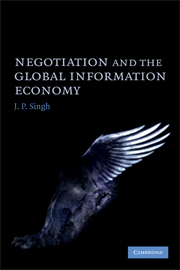Book contents
- Frontmatter
- Contents
- List of figures
- List of tables
- List of acronyms
- Preface
- 1 Introduction
- 2 Power, interests, and negotiations
- 3 Services and intellectual property: multilateral framework negotiations
- 4 Cultural industries and telecommunications: multilateral sectoral negotiations
- 5 Infrastructure pricing negotiations: evaluating alternatives when facing a significant market power
- 6 Electronic commerce: reaching agreement when facing market power in Internet governance and data privacy
- 7 Conclusion: power and governance
- Bibliography
- Index
4 - Cultural industries and telecommunications: multilateral sectoral negotiations
Published online by Cambridge University Press: 29 June 2009
- Frontmatter
- Contents
- List of figures
- List of tables
- List of acronyms
- Preface
- 1 Introduction
- 2 Power, interests, and negotiations
- 3 Services and intellectual property: multilateral framework negotiations
- 4 Cultural industries and telecommunications: multilateral sectoral negotiations
- 5 Infrastructure pricing negotiations: evaluating alternatives when facing a significant market power
- 6 Electronic commerce: reaching agreement when facing market power in Internet governance and data privacy
- 7 Conclusion: power and governance
- Bibliography
- Index
Summary
Has cultural botulism yet appeared anywhere in Europe? Is the culture in any of these European countries so flimsily anchored that European consumers must be caged and blinded else their links with their past, like an exploding star vanish? Or is the real game not culture, but commerce?
Jack Valenti, Former President Motion Picture Association of AmericaThe two negotiations examined in this chapter were part of the sectoral talks resulting from the evolving General Agreement on Trade in Services during the Uruguay Round. The previous chapter showed that the GATS agreement enabled countries to make their international commitments primarily based on their domestic liberalization schedules, making the task of services commitments easy. This chapter goes a step further: beginning with the same overarching GATS framework, two sets of negotiations are examined. Both were hard to negotiate – one ended in no-agreement on market liberalization and the other in agreement but after several modifications. However, both were part of the same services framework involving the same set of countries. Both are communication industries, one involving the telecommunication infrastructures and the other cultural industries, or audio-visual in WTO jargon. Both came out of the monopoly model: telecommunications and parts of audio-visual industry such as television and radio broadcasting feature either state monopolies or dominant state firms slated for future liberalization. Furthermore, in a digital age, both are about distributing and selling content and with convergence of technologies, the distinction between the two issues is becoming increasingly hard to maintain.
- Type
- Chapter
- Information
- Negotiation and the Global Information Economy , pp. 117 - 178Publisher: Cambridge University PressPrint publication year: 2008



